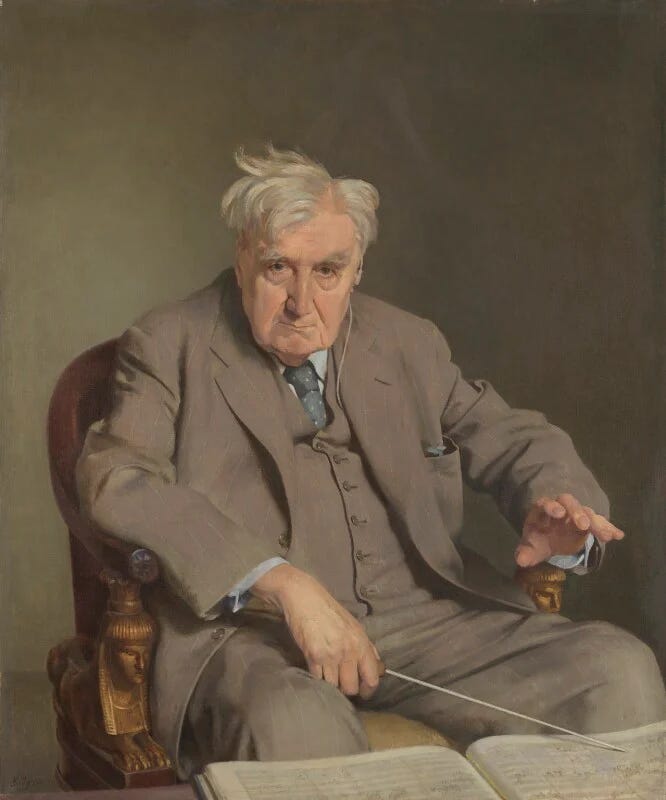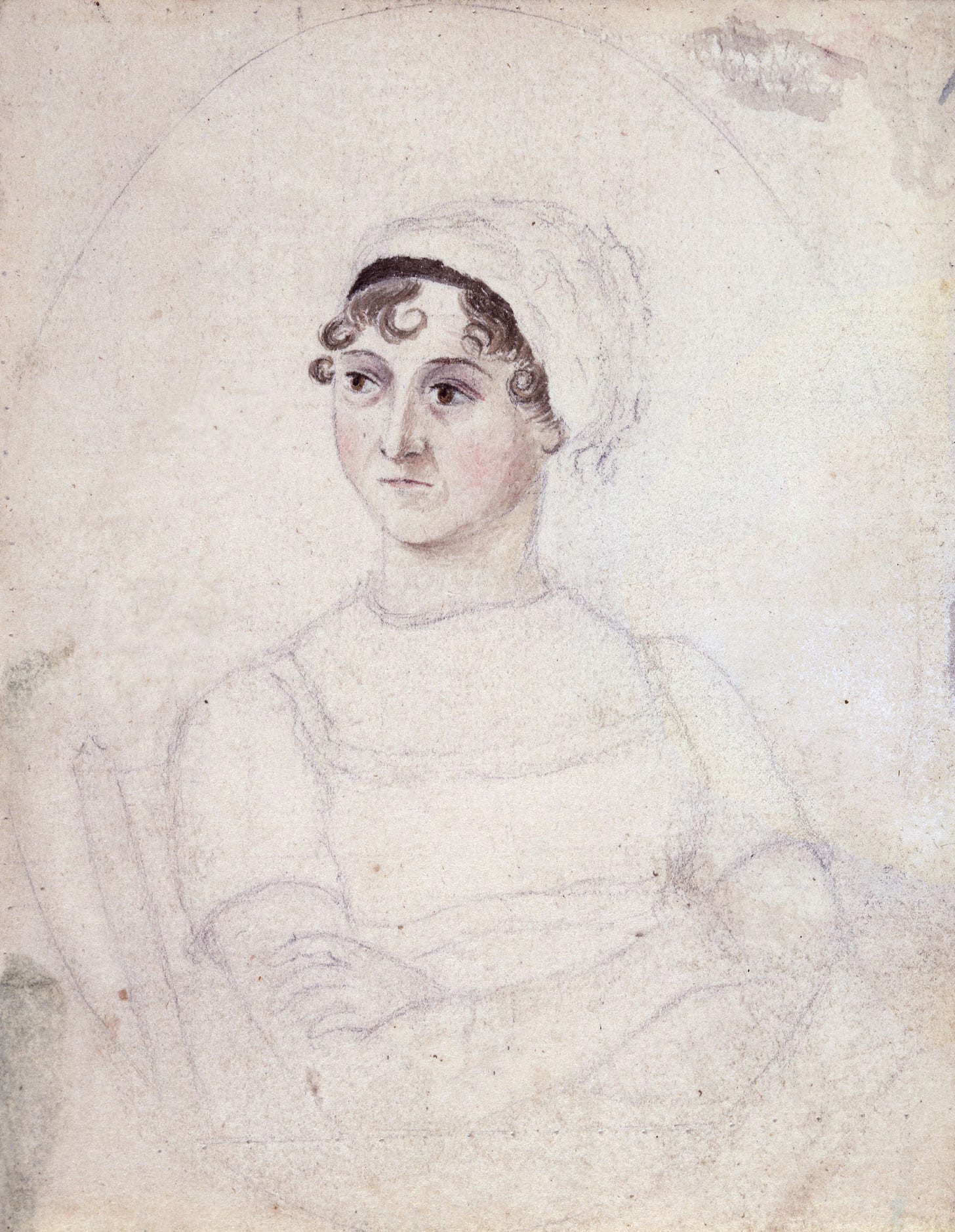One More Symphony
The conclusion of the RVW Challenge, and what’s next for PCF after Tolkien?
A Symphony with Sibelian Echoes
My favorite RVW symphony is the Fifth, and I am not unusual in that choice. I have the impression that it is his most popular symphony, though I have no special evidence for this. It is sublime, from the gentle, mysterious opening theme of the first movement all the way through the concluding Passacaglia. The English horn theme at the beginning of the third movement Romanza is one of RVW’s most beautiful melodies, despite (or perhaps because of) its simplicity.
RVW dedicated the symphony to one of my other favorite composers. On the manuscript of the score, he wrote: “Dedicated without permission and with the sincerest flattery to Jean Sibelius, whose great example is worthy of all imitation.” This makes sense if you are familiar with Sibelius’s music, especially the middle symphonies (say, the third through the fifth): there is a certain atmospheric and orchestral resonance (sorry for the imprecise terminology) that may make you think of these works. It is not, however, derivative, and it sounds much more English than Sibelius, probably because some of the melodies recall the folk-like qualities of RVW’s earlier music.
Our performance is André Previn’s classic recording with the London Symphony Orchestra.
I hope that you have enjoyed this listening challenge. We have just scratched the surface of Vaughan Williams’s music, and so you have lots more to explore if you are interested. Don’t sleep on his operas; they are rarely performed, but they are full of great tunes.
Here are links to the RVW playlist:
The RVW Listening Challenge Playlist on Apple Music
The RVW Listening Challenge Playlist on Spotify
What’s Next: Reading Challenges, Listening Challenges, and More
In the short-term, over the next few weeks, you can look forward to:
A two-part piece on David Bowie’s Young Americans album (revised, from the archives, from a time when I had exactly 17 subscribers).
A piece on the aesthetics of historical fiction, which may be of interest to those who have enjoyed
’s work on Anne Boleyn and ’s work on Hilary Mantel.Our next Meet-the-Artist Playlist (artist to be revealed).
And then, on June 12th, we begin our Emma Reading Challenge: six weeks with one of the greatest novels in the English language, including essays, guest posts, and a chapter-by-chapter guide with discussion questions for premium subscribers. Watch this space for the reading schedule, to be published soon.
I’m considering an appropriate listening challenge to accompany Emma. I chose Vaughan Williams to go along with Tolkien for reasons that I explained in this post. I would like to do something equally fitting for Austen.
Let’s do a poll. I’m thinking that one of the First Viennese School composers would be perfect to go along with Austen, so I’ll let y’all choose. Please vote, everyone, so we can hopefully get a nice consensus.
And here are the Reading Challenges for the next year or so, each of which will include bonus material for premium subscribers:
Emma (six weeks, June 12th-July 17th, 2024)
The world’s second-most famous Swift (i.e. Jonathan) (eight weeks, August 28th-October 16th)
Sir Gawain and the Green Knight (four weeks, November 13th-December 4th, 2024)
Chaucer (dates to be announced, starting January 2025)
Tolkien redux, including The Silmarillion and a chapter-by-chapter analysis of LOTR (dates to be announced, summer 2025)
So, we have a lot to look forward to. Please comment below with ideas or suggestions for the various challenges, along with ideas for other future reading or listening projects for PCF.
Thanks for reading, from my fancy internet typewriter to yours.







This all sounds great! Looking forward, in particular, to Chaucer.
Yes, the fifth is my favourite. It uses musical themes that Vaughan Williams also used in his opera Pilgrim's Progress, which he was also writing at the time. In his hand written manuscript, he wrote over the third movement, Romanza, these words from Bunyan's allegory:
'Upon that place there stood a cross
And a little below a sepulchre … Then he said
"He hath given me rest by his sorrow and
Life by his death'
The words were not published, as Vaughan Williams wanted the Symphony to be regarded as absolute music (the themes are purely musical), rather than program music (the themes are based on a written narrative). There is a slight snobbishness in the classical music world toward program music being of a lower order than absolute music, and Vaughan Williams had such a hard time breaking into the 'serious' composer category that I wonder if he was a bit self conscious.
There is a resemblance between Vaughan Williams and Sibelius in how they usually use the orchestras as a cohesive blend to produce tonal colours, rather than having each section's tonal colours play off one another the way most symphonic composers, such as Beethoven or Prokofiev, use the orchestra. But Sibelius's symphonies have the sound of the wind in vast pine forests and cold northern lights, while Vaughan Williams's success came in using the simple phraseology of folk music to weave a tapestry evocative of his British heritage.
I would chose Schubert. Austen described her work as an ivory miniature, and remained in the background for most of her short life. Beethoven is much too large, Mozart too famous, and Haydn too broadly humourous for her incisive wit. Schubert's work was written for drawing rooms like Austen's settings, his symphonic instrumentation is on the smallest possible scale, and like Austen was unknown outside his circle for most of his short life.